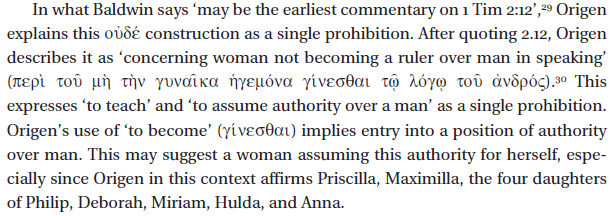Do you mind if I re-post a question I asked recently at B-Greek, but which hasn’t yet prompted any replies?
It’s a sentence from Origen’s commentary on 1 Corinthians 14:34-35
Καὶ ἄλλοθεν δὲ τοῦτο παραστήσω, εἰ καὶ ἐκεῖνο ἀσφαλέστερον εἴρηται περὶ τοῦ μὴ τὴν γυναῖκα ἡγεμόνα γίνεσθαι τῷ λόγῳ τοῦ ἀνδρός·
I am trying to understand what ἐκεῖνο is referring to here. There is a translation by Judith Kovacs of almost all the whole passage, but she leaves out most of this sentence, so I wondered if it might be obscure. I found this translation by Dr Yancy Smith on B-Greek [link removed as per rules]
‘But also from other passages I will support this thesis, since the point has been made more securely concerning the fact that a woman is not to be directing the man by means of discourse:’
Here is a longer excerpt:
ὅτε ἐλάλησε Μαριὰμ ἡ προφῆτις ἄρχουσα ἦν τινων γυναικῶν· αἰσχρὸν γὰρ γυναικὶ λαλεῖν ἐν ἐκκλησίᾳ, (20) καὶ διδάϲκειν δὲ γυναικὶ οὐκ ἐπιτρέπω ἁπλῶς ἀλλ’ οὐδὲ αὐθεντεῖν ἀνδρόϲ. Καὶ ἄλλοθεν δὲ τοῦτο παραστήσω, εἰ καὶ ἐκεῖνο ἀσφαλέστερον εἴρηται περὶ τοῦ μὴ τὴν γυναῖκα ἡγεμόνα γίνεσθαι τῷ λόγῳ τοῦ ἀνδρός· πρεϲβύτιδαϲ ἐν καταϲτήματι ἱεροπρεπεῖϲ, καλοδιδαϲκάλουϲ, ἵνα ϲωφρονίζωϲι τὰϲ νέαϲ, οὐχ ἁπλῶς ἵνα διδάσκωσιν.
For the whole Greek text, with translations of longer or shorter excerpts see [link removed, I can post the link to my site if it would help, or the Greek text itself - the relevant part is about 300 words]
Commentators, both conservative and egalitarian, have drawn conclusions about the meaning of 1 Timothy 2:12 from the phrase ‘περὶ τοῦ μὴ τὴν γυναῖκα ἡγεμόνα γίνεσθαι τῷ λόγῳ τοῦ ἀνδρός’. But almost the whole passage concerns women speaking in the assembly, with regard to 1 Corinthians 14, and it strikes me that the phrase could very well be referring primarily to that.
I would like to ask what τοῦτο is referring back to, and whether ἐκεῖνο is referring to the same thing, or whether one should understand a contrast, as between ‘this’ and ‘that’. Could it be that τοῦτο is referring back to the immediately preceding citation of 1 Timothy 2:12, and ἐκεῖνο is referring elsewhere? (Or the other way around?) I note that εἴρηται can be either present or aorist, which seems to expand the range of possibilities. [Plus one other question, which I didn’t like to ask of the professionals at B-Greek - is there any possibility that ἐκεῖνο might be accusative, with an adverbial sense like ‘there’, rather than nominative as I think Yancy Smith translated it - ‘the point’. I have looked in the lexicons to see if such exists, and the answer seems to be no, but I just wondered.]
Or, if I may ask a more open question, what is Origen saying here?
Andrew
